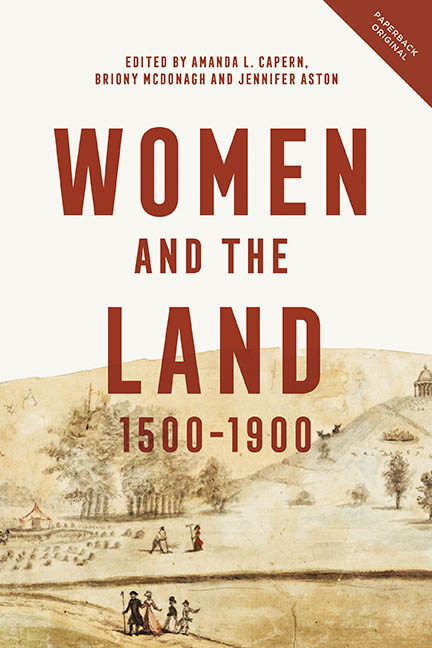Book contents
- Frontmatter
- Contents
- List of Illustrations
- List of Contributors
- Introduction: Women, Property and Land
- 1 Women, Work and Land: The Spatial Dynamics of Gender Relations in Early Modern England 1550–1750
- 2 Spinsters with Land in Early Modern England: Inheritance, Possession and Use
- 3 Becoming Anne Clifford
- 4 The Heiress Reconsidered: Contexts for Understanding the Abduction of Arabella Alleyn
- 5 From Magnificent Houses to Disagreeable Country: Lady Sophia Newdigate's Tour of Southern England and Derbyshire, 1748
- 6 On Being ‘fully and completely mistress of the whole business’: Gender, Land and Estate Accounting in Georgian England
- 7 Negotiating Men: Elizabeth Montagu, ‘Capability’ Brown and the Construction of Pastoral
- 8 Women's Involvement in Property in the North Riding of Yorkshire in the Eighteenth and Nineteenth Centuries
- 9 Invisible Women: Small-scale Landed Proprietors in Nineteenth-century England
- 10 More than Just a Caretaker: Women's Role in the Intergenerational Transfer of Real and Personal Property in Nineteenth-century Urban England, 1840–1900
- Afterword
- Select Bibliography
- Index
- PEOPLE, MARKETS, GOODS: ECONOMIES AND SOCIETIES IN HISTORY
Afterword
Published online by Cambridge University Press: 21 March 2020
- Frontmatter
- Contents
- List of Illustrations
- List of Contributors
- Introduction: Women, Property and Land
- 1 Women, Work and Land: The Spatial Dynamics of Gender Relations in Early Modern England 1550–1750
- 2 Spinsters with Land in Early Modern England: Inheritance, Possession and Use
- 3 Becoming Anne Clifford
- 4 The Heiress Reconsidered: Contexts for Understanding the Abduction of Arabella Alleyn
- 5 From Magnificent Houses to Disagreeable Country: Lady Sophia Newdigate's Tour of Southern England and Derbyshire, 1748
- 6 On Being ‘fully and completely mistress of the whole business’: Gender, Land and Estate Accounting in Georgian England
- 7 Negotiating Men: Elizabeth Montagu, ‘Capability’ Brown and the Construction of Pastoral
- 8 Women's Involvement in Property in the North Riding of Yorkshire in the Eighteenth and Nineteenth Centuries
- 9 Invisible Women: Small-scale Landed Proprietors in Nineteenth-century England
- 10 More than Just a Caretaker: Women's Role in the Intergenerational Transfer of Real and Personal Property in Nineteenth-century Urban England, 1840–1900
- Afterword
- Select Bibliography
- Index
- PEOPLE, MARKETS, GOODS: ECONOMIES AND SOCIETIES IN HISTORY
Summary
It is worthy of note that in 2019 a book on the significance of female landholding, constituting ‘a rebuttal to any implicit or explicit suggestion within the existing historiography that women were insignificant as landowners in early modern and modern history’, should even be required. Why would anyone think that women did not own and rent land as well as use it? At least through the seventeenth century, most English men lived directly off the land in the sense that they worked in agriculture. But farming required the labour of an entire family. Unmarried men, or women who were farmers, invariably had adult children or hired help. Even those involved in crafts and trades used the products of the land (leather, wood, wool, metal). More than 80 per cent of the population lived in communities of fewer than 5,000 people in 1700, and still in 1800 more than 70 per cent did so. So most people lived in rural areas where land was the principal form of wealth and offered a means of making a living through lease or labour, even if one did not own it. After all, everyone had to make a living.
This year is the centenary of Alice Clark's Working Life of Women in the 17th Century (1919), which expounded at length on the ways in which early modern women made a living, working outside as well as inside the home. The first three chapters are ‘Capitalists’, ‘Agriculture’ and ‘Textiles’, all of which are integrally related to land use. Working Life was not read only by scholars but was advertised in the main newspapers alongside other economic and feminist research from Routledge. Clark herself was a businesswoman, not an academic. Two decades earlier, Charlotte Carmichael Stopes’ British Freewomen had gone through three editions in the 1890s, expounding the history of women's property ownership and therefore entitlement to the franchise. A century ago everybody was more aware of the nexus between property and power in society and politics. Property was more of a political issue because of female exclusion from the citizenship rights in a voting system based on property.
The recent celebrations of the centenary of women's suffrage in Britain should bring to mind the significance of women's entitlement to property.
- Type
- Chapter
- Information
- Women and the Land, 1500–1900 , pp. 267 - 276Publisher: Boydell & BrewerPrint publication year: 2019

